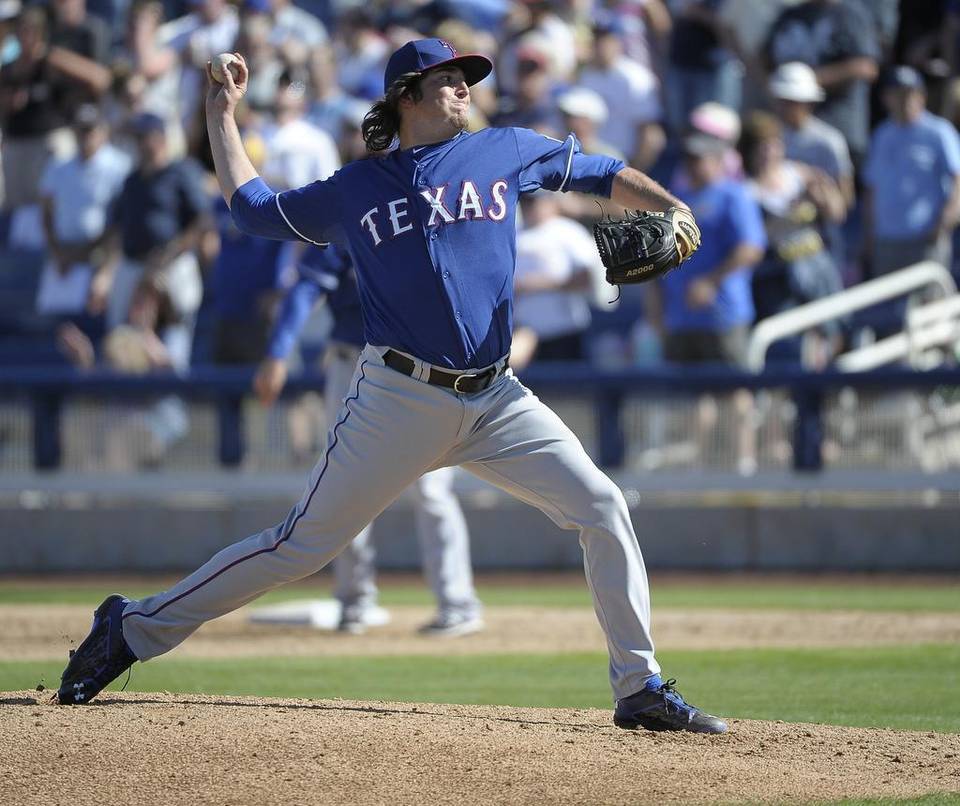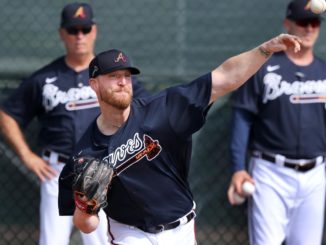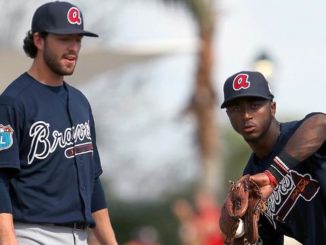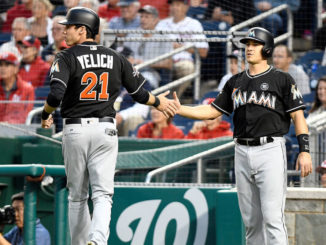12/8 – Atlanta Braves trade RHP Tyrell Jenkins & LHP Brady Feigl to the Texas Rangers for RHP Luke Jackson.

After the morning events, which involved releasing Williams Perez to make room for Rule V pick Armando Rivero, Atlanta engineered a trade, a two-for-one pitcher swap, to close a busy day.
Luke Jackson, 25, was the 45th overall pick of the 2010 draft, and he comes to Atlanta after a disappointing but tantalizing run through the minors in Texas. Jackson was long envisioned as a starter, primarily because he had the durability to do so. He maintains his velocity well into games, so why not? The secondary pitches, that’s why not. While Jackson’s fastball/curve combo draws rave reviews, his changeup and slider failed to impress. While it’s possible those pitches could improve enough for Jackson to be a successful starter, scouts aren’t believers. Neither were the Rangers, who converted Jackson to a full-time relief role in 2015, a role which continued last season.
Jackson’s results have been, more or less, underwhelming. He has impressive K rates in the minors, but with walk numbers so high it saps a good bit of the value. In his brief time at the MLB level, he’s walked more (10) than he’s struck out (9). The Braves hope they can steer him in the right direction, and if they can, there’s a valuable reliever lurking somewhere under the waves. Cutting the free passes by 2 men per nine still leaves him walking more than he’d like, but it would at least be manageable. As much life as he gets out of that fastball/curve combination, it’s an attractive raw set of skills. However, at 25, time is starting to run out on converting those skills into on-field results. Hopefully, that comes together in Atlanta. As a reliever, it’s more likely to, and the friendlier confines of Smyrna and Buford should be better for his confidence than those of Arlington and Round Rock.
The cost of acquiring Jackson wasn’t extraordinarily high. Tyrell Jenkins was an extremely likeable player, but he wasn’t a particularly effective one, at least at the major league level. He might be an adjustment away from a breakthrough, but it became apparent that Atlanta, like St. Louis before them, couldn’t figure out what that adjustment was. It’s hard to figure out why a guy with a mid-90’s fastball, good power curve, and occasionally good changeup, can be so over-reliant on teammates in the field to register outs, but Jenkins’ peripherals just never really seemed to match his talent, at least at the upper levels. In a way, this is a classic change of scenery move. Texas sends Atlanta its talented guy with a good fastball/curve combo who can’t quite put it together, and Atlanta sends one back. If he does put it together in Texas, be happy for the guy.
Brady Feigl will be 26 next season, and he’s thrown 2/3 of one inning in the upper minors. He was once a fast-riser, even getting some talk as a guy who would potentially break camp with the team in 2015 (here’s a great profile of Feigl at the time from our colleague Tommy Poe). He didn’t, and then he almost immediately hit the shelf with Tommy John surgery. So, the lack of minor league progress is a bit misleading, as its a circumstance of Feigl’s body failing him, not the results on the field. Still, when you consider he also had a labrum issue in college, Feigl at this point is a bit of a risky bet. For a lefty with spotty command, extended time not being able to throw a baseball is not a tonic for success, and he’s unfortunately had to spend far too much time recovering rather than improving. At the very least, here’s wishing him good health in the Texas organization.
All in all, it’s not a particularly exciting trade for either team involved, but it buys optimism on both sides. Texas fans are tired of seeing Luke Jackson’s results not line up with his talent. Braves fans, likewise with Tyrell Jenkins. There’s optimism in acquisitions like this in that you may be the one to really make it work. Your pitching coach is the guy that could click with this kid. Jackson’s upside is the highest of the players involved (hence why he was the 1 in the 2-for-1 deal), but all are due a soft reset in a way. Maybe it works, but there’s not a ton of risk in this trade for either side.
Expect Jackson to compete for a bullpen role in the spring.




Leave a Reply